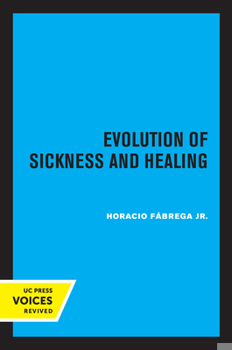Evolution of Sickness and Healing
Select Format
Select Condition 
Book Overview
Evolution of Sickness and Healing is a theoretical work on the grand scale, an original synthesis of many disciplines in social studies of medicine. Looking at human sickness and healing through the lens of evolutionary theory, Horacio F?brega, Jr. presents not only the vulnerability to disease and injury but also the need to show and communicate sickness and to seek and provide healing as innate biological traits grounded in evolution. This linking of sickness and healing, as inseparable facets of a unique human adaptation developed during the evolution of the hominid line, offers a new vantage point from which to examine the institution of medicine. To show how this complex, integrated adaptation for sickness and healing lies at the root of medicine, and how it is expressed culturally in relation to the changing historical contingencies of human societies, F?brega traces the characteristics of sickness and healing through the early and later stages of social evolution. Besides offering a new conceptual structure and a methodology for analyzing medicine in evolutionary terms, he shows the relevance of this approach and its implications for the social sciences and for medical policy. Health scientists and medical practitioners, along with medical historians, economists, anthropologists, and sociologists, now have the opportunity to consider every essential aspect of medicine within an integrated framework. This title is part of UC Press's Voices Revived program, which commemorates University of California Press's mission to seek out and cultivate the brightest minds and give them voice, reach, and impact. Drawing on a backlist dating to 1893, Voices Revived makes high-quality, peer-reviewed scholarship accessible once again using print-on-demand technology. This title was originally published in 1997.
Format:Paperback
Language:English
ISBN:0520307143
ISBN13:9780520307148
Release Date:April 2022
Publisher:University of California Press
Length:382 Pages
Weight:1.24 lbs.
Dimensions:0.8" x 6.0" x 9.0"
Customer Reviews
1 rating
Dry and academic but intriguing and useful
Published by Thriftbooks.com User , 23 years ago
I stumbled across this book from the University of California Press when I was looking for source material on "societal development." If you're a graduate student at certain universities, you'll recognize that general topic as something you may have to write 30 or 60 pages on someday. As it later happened, my "breadth" paper on societal development went in a different direction, but this book was interesting reading anyway.Fabrega discusses how our view of illness has changed, how our treatment of illness have changed, and how different societies have different views of illness. For example, things treated as medical disorders in Western society - obesity, cosmetic defects - may not be treated as a medical issue at all in other societies. He also discusses the possibility that humans have specifically evolved an adaptation for sickness and healing, which he calls the SH adaptation. That is, that there have been evolutionary advantages to some people in being sick, and advantages to other people in being the sort of person who helps the sick. This point of view can be compared with Robert Sapolsky's (_Why Zebras Don't Get Ulcers_) since both Fabrega and Sapolsky discuss illness in our primate cousins, the chimpanzees. Fabrega's approach is more ethonological/anthropological, while Sapolsky's is more biology, and Sapolsky's book is written more for a popular audience. Both have interesting things to say about our perception of and treatment of mental illnesses. One could completely round out a paper about how society shapes the concept of illness, and how diseases, epidemics, etc. have shaped society, by reading Jared Diamond's _Guns, Germs and Steel_ and, if one had time, Hans Zinsser's _Rats, Lice and History_, an "autobiography" of typhus.Chapter subtitles include: *"Sickness and Healing and the Problem of Social Change and Evolution;" "Conjuring Up the Archaeology and Prehistory of Sickness and Healing;" "Sickness Cheating;" "Sickness and Healing in Chiefdom, Prestate, and State Societies;" "The Higher Prevalence of Psychiatric Disorders" and so on. There are discussions of traditional Chinese medicine, the Islamic view of medicine and healing, and other non-Western aspects, so that this book is not limited to "Western" medicine.This wouldn't be the very first book I'd read on the topic- it's academic enough to scare off a casual reader - but it's definitely an interesting resource for those interested in how society is reflected by its treatment of the sick.






